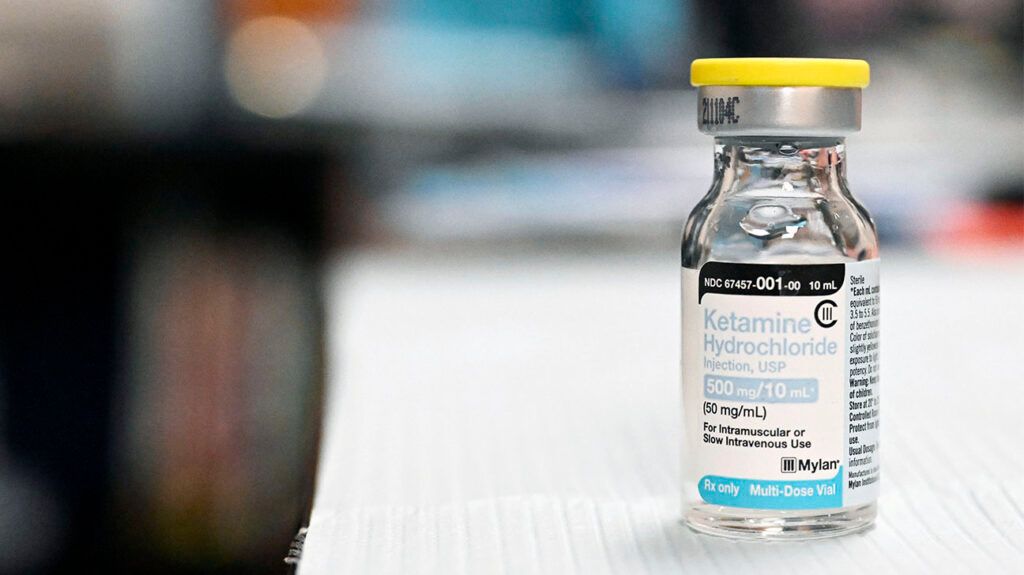Ketamine is a type of anesthetic. Doctors also prescribe ketamine to treat treatment-resistant depression (TRD). Some research suggests that if taken correctly for TRD, it is unlikely to become addictive.
TRD is a form of depression. It occurs when a person’s depression does not improve after treatment with at least two antidepressants. Healthcare professionals may treat a person with TRD using intravenous (IV) ketamine or an esketamine (Spravato) nasal spray.
People also can potentially misuse ketamine. People may take it recreationally for its hallucinogenic properties. The possession of ketamine without a prescription is illegal in the United States.
Read on to learn more about the risks of ketamine as a treatment for TRD, its potential benefits, and other treatments for depression.

A
Other research from 2022 notes that few studies contain information regarding the addictiveness of ketamine as a TRD treatment. The researchers surveyed 33 people about their experience when taking ketamine to treat TRD. Researchers found that these participants were not at risk of ketamine misuse.
The National Health Service (NHS) of the United Kingdom states that when taken to treat TRD, ketamine is less addictive than nicotine and strong opiates.
If a person taking ketamine for TRD feels they are craving it or taking higher doses than recommended, they should speak with a doctor.
Help is available
Seeking help for addiction may feel daunting or even scary, but several organizations can provide support.
If you believe that you or someone close to you is showing signs of addiction, you can contact the following organizations for immediate help and advice:
- Substance Abuse and Mental Health Services Administration (SAMHSA): 800-662-4357 (TTY: 800-487-4889)
- 988 Suicide & Crisis Lifeline: 988
Ketamine has the potential to help people with depression that does not respond to traditional treatments. A
A
According to the National Institute of Mental Health (NIMH), esketamine (Spravato) may treat depression symptoms
Ketamine may cause a person to experience certain side effects. This may occur even in the low doses prescribed by doctors.
The
- sleepiness
- dissociation, which is when a person feels disconnected from their mind and body
- psychiatric events
- worsening of psychiatric disorders
- increases in blood pressure
- slow, shallow breathing
- lower urinary tract and bladder symptoms
The National Alliance on Mental Illness (NAMI) states the potential side effects of Spravato include:
Rare side effects of Spravato include:
- chest pain
- changes in vision
- sudden severe headaches
- shortness of breath
- seizures
- problems urinating
- problems thinking clearly
A person should contact a doctor immediately if they experience any of these side effects. Depending on the severity, a healthcare professional may suggest a person take a lower dose or try a different medication instead.
The NIMH states that
- psychotherapy
- antidepressants
- brain stimulation therapy, which involves stimulating the brain with electricity
A person may also find it helpful to make certain lifestyle changes to manage their depression. These may include:
- getting regular physical activity
- eating regular, healthy meals
- having a regular bedtime and wake-up time
- splitting big tasks into smaller, more easily manageable ones
- trying to connect with other people
- delaying making big decisions until symptoms improve
- avoiding alcohol, smoking cigarettes, and recreational drug use, if applicable
A person should speak with a doctor if their depression does not improve with treatment. They should also speak with a healthcare professional if their depression worsens or if they experience suicidal thoughts. A doctor can discuss alternative treatments with them or adjust medication doses.
People should also
Help is out there
If you or someone you know is in crisis and considering suicide or self-harm, please seek support:
- Call or text the 988 Lifeline at 988 or chat at 988lifeline.org. Caring counselors are available to listen and provide free and confidential support 24/7.
- Text HOME to the Crisis Text Line at 741741 to connect with a volunteer crisis counselor for free and confidential support 24/7.
- Not in the United States? Find a helpline in your country with Befrienders Worldwide.
- Call 911 or your local emergency services number if you feel safe to do so.
If you’re calling on behalf of someone else, stay with them until help arrives. You may remove weapons or substances that can cause harm if you can do so safely.
If you’re not in the same household, stay on the phone with them until help arrives.
Ketamine is a drug a doctor can prescribe to treat treatment-resistant depression (TRD). People may take it through an IV infusion or nasally.
There is limited information regarding the addictiveness of ketamine when taken as a treatment for TRD. Some research suggests it is unlikely to be addictive if a person takes it as prescribed by a doctor. However, more research into the topic is necessary.
Ketamine works within several hours to treat symptoms of TRD. Its effects may last several days.
However, ketamine may cause side effects, such as sleepiness, dissociation, and increases in blood pressure. A person should speak with a doctor if they experience side effects when taking ketamine.
People should contact a healthcare professional if their depression worsens or does not improve with treatment. They should also speak with a doctor immediately if they experience any concerning side effects when taking medication to treat depression.
